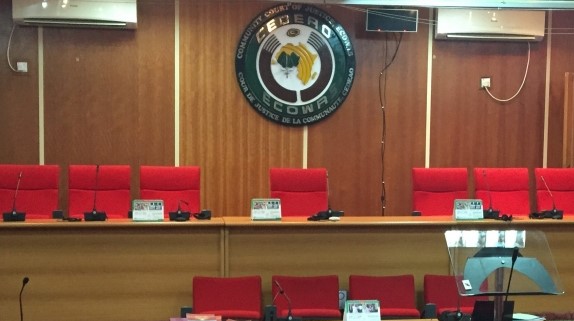ECOWAS Court dismisses convict’s request to complete jail term in Nigeria
The ECOWAS Court of Justice has dismissed all the requests made by a Nigerian prisoner in the United States, Richard Ugbah, to complete the remainder of his sentence in Nigeria. The Nigerian had asked the Court to order his transfer from the United States, where he is serving a 12-year imprisonment for wire fraud. In the […]

ECOWAS Court
The ECOWAS Court of Justice has dismissed all the requests made by a Nigerian prisoner in the United States, Richard Ugbah, to complete the remainder of his sentence in Nigeria.
The Nigerian had asked the Court to order his transfer from the United States, where he is serving a 12-year imprisonment for wire fraud.
In the suit No: ECW/CCJ/ APP/ 18/21, filed in the Court, the applicant, who was sentenced to 12 years imprisonment having been found guilty of wire fraud by a US Court on 14/2/2017 asked the ECOWAS Court to order his transfer to Nigeria, having satisfied the requirements for such a transfer.
In its judgment on 14 December 2023 delivered by Justice Sengu Mohamed Koroma, Judge Rapporteur, the Court declared that it lacks jurisdiction to hear the matter.
In dispensing with the issues, the Court held as to admissibility, that the Second Respondent, the Ministry of Justice of the Federal Republic of Nigeria is not a proper party before this Court.
However, it upheld the preliminary objection raised by the First Respondent, the Federal Republic of Nigeria and declared the claims before it as unfounded and without legal basis.
Consequently, it dismissed all the reliefs sought by the Applicant.
In the Initiating Application, the Applicant averred that he is a Nigerian citizen resident in the US who was convicted by the District Court for the Western District of Wisconsin after he pleaded guilty to one count of wire fraud on 14/2/17 and was sentenced to 12 years imprisonment.
Additionally, he pleaded guilty on 15th November 2017 on another count of conspiracy to commit fraud and judgment was entered on 22/11/17.
The Applicant further stated that having served eight years of the sentence, he is due for release on 8th May 2026.
He urged the Court to issue the orders having satisfied the conditions for transfer to complete the term in Nigeria in line with the provision of the United Nations Office on Drugs and Crime Handbook on the International Transfer of Sentenced Persons.
He also averred that the transfer of sentenced persons is seen to be an important means of cooperation to prevent and combat crimes, which is the purpose of the United Nations Convention against Illicit Traffic in Narcotic drugs and psychotic substances of 1998, the United Nations Convention against corruption and the United Nations Convention against Transnational organized crime.
The Applicant further asserted that all three conventions mentioned above, refer to the possibility of concluding agreements to facilitate the transfer of persons convicted abroad for the offences covered by the conventions to another state to complete their sentence.
The Respondent, Federal Republic of Nigeria, filed a Preliminary Objection contending that the Applicant’s Initiating Application is incompetent having regard to Articles 9 and 10 of the Supplementary Protocol (A/SP./01/05).
They added that the 2nd Respondent, the Ministry of Justice is neither a Community Institution nor a signatory to the Economic Community of the West African States Treaty. The Respondent further claimed that the Honourable Court lacks the Jurisdiction to entertain this suit.
The Respondent, therefore, urged the Court to strike out the notice of registration for want of jurisdiction and lack of cause of action.
In its decision, the Court recognized that both parties wanted to remove the Second Respondent from the case, arguing that it was an improper party. The Court struck out the Second Respondent on this basis.
The Court also stated that the Applicant hasn’t shown a valid reason for their complaint against the Respondent.
Additionally, the Court finds that the matter of competence is a legal issue and the argument presented by the Applicant has no legal basis vesting the Court with the authority to hear and determine the case. As a result, it dismissed the claim and upheld the Respondent’s Preliminary Objection.
The other judges on the panel were Justices Dupe Atoki (Presiding) and Ricardo Claúdio Monteiro Gonçalves (Member).
